Greek Independence Day: A Selection from the Villanova Digital Library
March 25 is Greek Independence Day. The holiday commemorates the start of the Greek War of Independence in 1821, which concluded a nearly 400-year period of Ottoman rule in Greece. The anniversary is commemorated with parades in both Greece and the diaspora. The Philadelphia parade, which is set for Sunday, April 2 this year, takes place along Benjamin Franklin Parkway and 22nd Street. The celebration includes Greek folk dance troupes, educational and religious organizations, government representatives, and members of the Evzones, or Greek Presidential Guard, who guard the Tomb of the Unknown Soldier in Athens, Greece.

Vryzakis, Theodoros (1814/1819-1878). “The Bishop of Old Patras Germanos Blesses the Flag of Revolution.” 1865. Oil on canvas, 164 x 126 cm. National Gallery, Alexandros Soutsos Museum, Athens, Greece. Image in the Public Domain.
While Greece’s conflicts with the Ottoman Empire are more widely known, the British Empire also exercised colonial rule over parts of Greece in the nineteenth century, specifically in the Ionian islands to the west of the mainland. This region had been under Venetian control from the fourteenth to the late seventeenth centuries, before it was conquered by the French during the French Revolution and again during the Napoleonic Wars. However, in the Congress of Vienna of 1814-1815, the British Empire acquired the Ionian Islands as a protectorate, named the United States of the Ionian Islands, with the island of Corfu (or Kerkyra) as its capital. The protectorate existed until 1864, when Great Britain ceded the Ionian islands to Greece upon the enthronement of the Greek King George I. Sakis Gekas’ Xenocracy: State, Class, and Colonialism in the Ionian Islands, 1815-1864 (2017) explores this period in detail; Falvey offers digital access to the Gekas’ book. The legacy of the Protectorate period is still felt in several landmarks across the Ionian islands, especially in Corfu. For instance, the Old Fortress of Corfu includes the Church of St. George, an Anglican church built for British soldiers in 1840.
A rare pamphlet that was recently added to the Villanova Digital Library as part of the Joseph McGarrity Collection sheds further light on this part of modern Greek history. Titled A refutation of the assertions of Sir Howard Douglas, in his despatch of the 10th April, 1840, concerning the faction which he imagined to exist in the Ionian Islands, the pamphlet was written by Greek historian Giovanni Petrizzopulo and published by Morton’s English and Foreign Printing Office in 1840. The pamphlet’s author describes it as a “remonstrance against one of the outrages of despotic power in the Ionian Islands.” Petrizzopulo’s criticism is directed at Sir Howard Douglas (1776-1861), who served as Lord High Commissioner of the Ionian Islands at the time. Douglas was responsible for an official search of Petrizzopulo’s house in Corfu under suspicion of rebellious activity.

Title page. Petrizzopulo, Giovanni. A refutation of the assertions of Sir Howard Douglas… 1840. London: Morton’s English and Foreign Printing Office.
Even though Petrizzopulo appeals to British authority (his pamphlet is addressed to Lord John Russell (1792-1878), Secretary for the Colonies), and attempts to defend himself from accusations of treason, his writing nonetheless adopts a critical tone toward British policy. In a book chapter titled “The Philorthodox Conspiracy in the British-Ruled Ionian Islands,” Lucien J. Frary draws on passages from Petrizzopulo’s pamphlet and argues that “Petrizzopulo was disgusted with the British government and accused it of exercising despotic power.” Moreover, Frary frames the incident at Petrizzopulo’s home as a part of a larger British attempt to suppress revolt in the Ionian Sea, writing that “Any suspicion of communicating with Greece served as a pretext for the government to carry out a search.” Falvey offers digital access to Frary’s full book.
Petrizzopulo’s pamphlet joins several other items on the Villanova Digital Library that are relevant to modern Greek history, such as an early-twentieth-century French souvenir photo album, which is discussed in a Falvey blog article, as well as Divry’s vest-pocket English-Greek and Greek-English dictionary (1914), which is likewise highlighted on our blog. Petrizzopulo’s pamphlet can be accessed digitally on the Digital Library. Alternatively, it can be consulted in-person in Falvey’s Rare Book Room during walk-in hours (Wednesdays 9:30-11:30 AM and Thursdays 2-4 PM) or by appointment.
0 Comments »
No comments yet.
RSS feed for comments on this post. TrackBack URI
